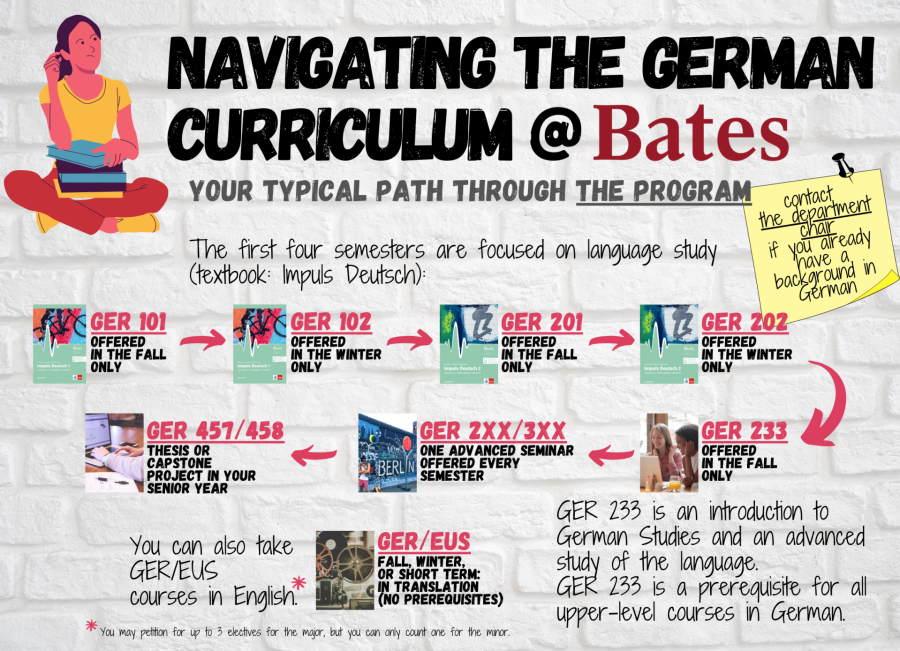The German program at a glance
On this page you will find answers to the most popular questions about the courses in the German program.
The overview of the German Curriculum:

+I want to take a German language course at Bates. Where do I start?
You should take our placement questionnaire that will help us to find the best course for you.
If you have spoken German at home or somewhere else or have studied German in a classroom (in high school, college, university, language, or summer school, etc.), the questionnaire will help you determine what course level is appropriate for you. Your professor will reach out to you to confirm the selection or ask you more questions.
If you have never learned German before, the best course for you is GER 101.
+I am not interested in learning German but I would like to take a course on German cultures, literatures, and film in English.
We offer courses in English: most of them are cross-listed with the European Studies program. Some of our courses that don’t require German, are open to first-year students, and don’t have other pre-requisites are:
GER s26. The Split Screen: Reconstructing National Identities in West and East German Cinema. This course investigates selected films from West and East German after 1945. Students engage a broad range of topics and issues that define the popular view of Germany and its cultures today. They discuss Germany’s Nazi past, the postwar division of the country and its reunification in 1990, the legacies of the 1968 generation, and diversity in contemporary Germany (offered in the Short Term).
EU/GR 254. Berlin and Vienna, 1900–1914. From the beginning of the twentieth century to the outbreak of World War I, the capital cities of Berlin and Vienna were home to major political and cultural developments, including diverse movements in art, architecture, literature, and music, as well as the growth of mass party politics. Students discuss urban growth and its social effects, class and gender anxiety, the role of the military, empire and nationalism, colonialism at home and abroad, and others.
EUS 215. Jewish Lives in Eastern Europe. This course is an exploration of the cultural landscape of Eastern Europe in the late nineteenth and early twentieth centuries with a focus on Jewish experience. What did it mean to be Jewish under the Austro-Hungarian and Russian empires and in the interior war republics that replaced them?
EUS 240. Daily Life under Hitler and Stalin. In this course, students examine everyday life in two of the twentieth century’s most brutal political systems: Hitler’s Nazi Germany and Stalin’s USSR. They pay particular attention to how these two totalitarian regimes dominated the public sphere from the late 1920s to the end of World War II, and examine the question of agency: To what extent were the citizens of the Third Reich and the USSR manipulated subjects, willing participants, or sympathetic fellow travelers?
+I have learned German in my high school, or my family and I speak German. I am interested in continuing my language study. What should I do?
You should take the placement questionnaire that will help us to find the best course for you. If you have spoken German at home, or somewhere else in an informal setting, the questionnaire will help you determine what course level is appropriate for you. If you have studied German in a classroom (in high school, college, university, language, or summer school, etc.), you will be asked how long you’ve been learning the language and when did you take your last German class. After you complete the questionnaire, your professor will reach out to you to give you more information or ask you more questions.
+I have Advanced Placement credit in “German Language and Culture.” Does it count for anything?
A student who achieves a score of four on an Advanced Placement examination given by the Educational Testing Service (ETS) in “German Language and Culture” may be granted one course credit in German. A student who achieves a score of five may be granted two course credits in German. Please contact the department chair to determine which courses in the German program can be seen as equivalent to your Advanced Placement credit.
Upon the approval of the chair, students who have AP credit in “German Language and Culture” (a score of four or five) can apply the credits toward the major.
For more information about the general policy for Advanced Placement, see this document.